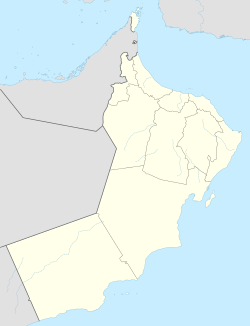Khasab
|
Khasab خصب |
|
|---|---|
| Town | |

Central square of Khasab
|
|
| Location in Oman | |
| Coordinates: 26°11′N 56°15′E / 26.183°N 56.250°E | |
| Country |
|
| Governorate | Musandam Governorate |
| Population (2003) | |
| • Total | 17,730 |
| Time zone | +4 (UTC+4) |
Khasab (Arabic: خصب Ḫaṣab) is a city in an exclave of Oman bordering the United Arab Emirates. It is the local capital of the Musandam peninsula and has frequently been dubbed the "Norway of Arabia" because of its extensive fjord-like craggy inlets and desolate mountainscapes.
The Portuguese built Khasab at the beginning of the 17th century, at the height of their naval presence in the region. The natural harbour gave shelter from rough seas. Unlike many forts, which were built on high ground for defensive purposes, Khasab was designed as a supply point for dates and water for Portuguese ships sailing through the strait. Today, Khasab is protected from floods by three large dams.
Access to the area by land was virtually impossible until a modern coast road was built, which allows fast access from the United Arab Emirates, making Khasab a popular weekend destination for people living in the Emirates. The new road also allows access to the village of Tawi, where prehistoric drawings of boats, animals and warriors can be seen in the rock face. Khasab also has a number of modern shopping areas with imported Irani goods and locally created pottery, and a few hotels, including the Khasab Hotel, Atana Musandam Resort and Atana Khasab Hotel, which sits on a cliff overlooking the Persian Gulf.
Khasab has an interesting trading position, which hinges on its proximity to Iran. Iranians export sheep and goats into the local port, from where the animals are dispatched to the United Arab Emirates and Saudi Arabia in trucks. On their return trip to the Islamic Republic, the sailors load their boats up with electronic goods and American cigarettes, arriving in Khasab after sunrise and leave before sunset to conform with Omani immigration laws. Since the trading is illegal under Iranian law, they must avoid the Islamic Republic's coastguard as well as all other shipping in the busy waters of the Strait of Hormuz. The crossing is hazardous since the vessels, piled high either with livestock or with numerous boxes must avoid the path of the scores of oil-tankers which pass through the Strait in a transverse direction daily. Recent increases of United States sanctions against Iran have increased the amount of smuggling done through Khasab.
...
Wikipedia

